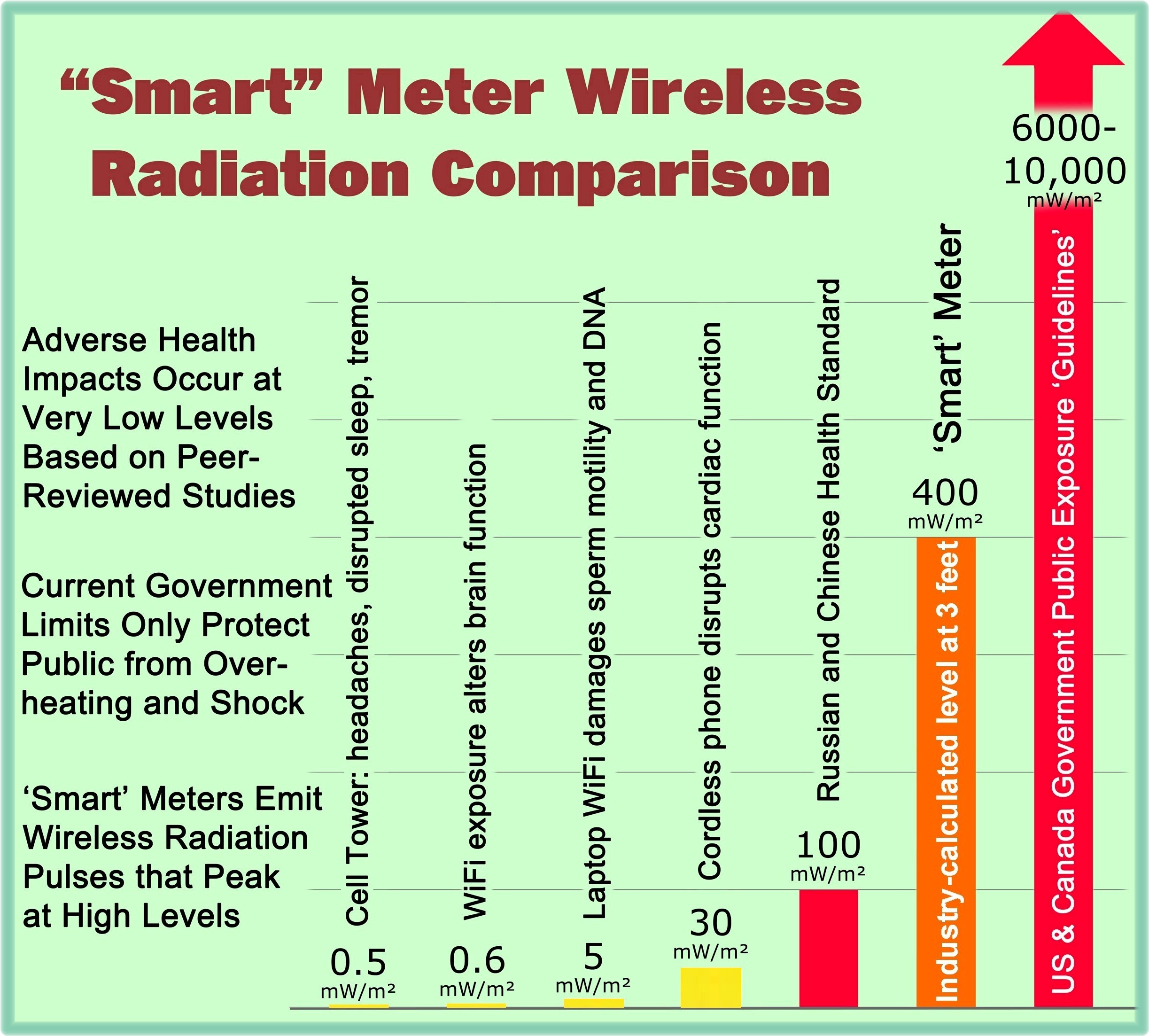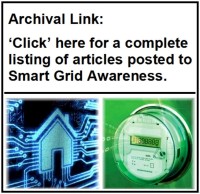by K.T. Weaver, SkyVision Solutions
 In May we reported on a positive story that a Michigan Court Orders Justification of Smart Meter Refusal Fees. The Court document for this case stated that:
In May we reported on a positive story that a Michigan Court Orders Justification of Smart Meter Refusal Fees. The Court document for this case stated that:
“…because of the numerous issues raised on appeal … concerning tariffs for customers who elect to opt-out of the AMI program, we remand those issues to the PSC and direct the PSC to conduct a contested case hearing on the opt-out tariff. … “We direct the PSC to issue a detailed opinion with sufficient facts and conclusions of law that allows this Court to review the entire scope of the unusual opt-out tariff.”
In a motion for reconsideration of the previously reported decision, the Michigan Public Service Commission (PSC) requested that the state of Michigan forego any further hearings for this case. The PSC contended that no further hearings were necessary concerning the advanced metering infrastructure (AMI) smart meter program. The PSC implied that the Court’s prior remand instructions, in essence, exceeded the scope of its responsibility. Specifically, the PSC contended that it had conducted sufficient hearings as related to “cost of service principles” on all issues and it need not conduct further hearings.
In an order issued July 22, 2015, the PSC’s motion for reconsideration was denied by the Court. Hearings will be scheduled by the PSC as originally ordered. As stated by Presiding Judge Peter D. O’Connell, it is expected that:
“the PSC on remand [will] grant the individual appellants a full and fair due process hearing so that they would have their day in court and would be able to air their concerns about the AMI program. In our form of government, the least a governmental body should do is listen to its citizens and provide a forum to allow them to air their grievances. Unfortunately, in its motion for reconsideration, the PSC claims it has already done so: ‘What this Court is requiring the Public Service Commission to do on remand has already been done.’ The PSC claims, “The Commission has already ‘thoroughly’ addressed the issues this Court remanded. … If the above statements were correct, I would not have voted to remand this case for further proceedings.”
Judge Michael Gadola writes that scope of the remand from the Michigan Court of Appeals remains as previously set forth, i.e., for the PSC to issue a detailed opinion with sufficient facts and conclusions of law that allows the Court to review the entire scope of the unusual opt-out tariff.
Separately, Presiding Judge Peter D. O’Connell issued an opinion which will not increase the scope of the remand to the PSC, but yet the opinion reveals a Judge who has significant concerns over smart meters. Possibly there are lessons for everyone to read what this Judge has written.
Here are selected quotations from the separate opinion by Judge Peter D. O’Connell (with bold font emphasis added):
STATE OF MICHIGAN COURT OF APPEALS
Before: O’Connell. P.J., and Fort Hood and Gadola, JJ.
O’CONNELL, P.J.
“The PSC and Consumers Energy advance the notion that smart meters will save the public money on their utility bills. Unfortunately, this argument is inherently illogical: how can smart meters save money when Consumers seeks to add millions of dollars to the base rate to fund the AMI program? It appears, as the Attorney General argues and as in other states, that the smart meter program actually increases rates. Remand is necessary for the PSC to articulate the total cost of the AMI program.”
“I am concerned that under the opt-out program, those who opt-out must pay either a penalty, tax, or a fee for the privilege of retaining their non-smart meters. This Court, in its prior opinion, approved the PSC’s order allowing costs to fund the AMI smart meter program to be added to the utility’s base rate. At first glance, it appears the opt-outers are required to pay twice for the privilege of retaining their non-smart meter. The first payment is in the form of a penalty, tax, or fee to avoid having a smart meter installed on their home, and the second payment is of continued costs associated with the AMI smart meter program that eventually will be added to the base rate.”
“From this lower court record I am unable to discern the genesis, the reasons, or the rational for such an unprecedented double tariff. … On remand, I would require the PSC to articulate a factual basis and a detailed analysis of its reasons for selecting this methodology and to further articulate and supplement their prior opinion why these costs are not already included in the base rate associated with the AMI program.”
“I am also greatly concerned that the opt-out costs are actually a penalty imposed to force the opt-outers to comply with the AMI program. On remand, the PSC is charged with the task of determining if this new cost is a penalty, a tax, or a legitimate fee.”
“The PSC’s implied finding that it is a fee/tariff rather than a penalty or a tax is not supported by even a scintilla of evidence in this lower court record. Just because the PSC says it is so on appeal does not make it so.
 “An extensive hearing where all are invited to air their concerns about the smart meter program may persuade the public that the ‘fox is not watching the henhouse,’ and more importantly, that sufficient safeguards are in place to implement the smart meter program.”
“An extensive hearing where all are invited to air their concerns about the smart meter program may persuade the public that the ‘fox is not watching the henhouse,’ and more importantly, that sufficient safeguards are in place to implement the smart meter program.”
[Footnote:] “We should all be aware of the frailties inherent in the PSC’s genetics. It is expected to protect the public’s interests while working closely with the utilities that it is supposed to protect those interests from. This situation is often referred to as putting the fox in charge of the henhouse. A fox-and-henhouse situation arises when a person in charge of making a decision may have a conflict of interest.”
“Some citizens are alarmed over the potential health, safety, privacy, and cost issues associated with the smart meter program. To Consumers Energy and the PSC’s credit, it appears that they both are minimally aware of the public concern over the smart meter program; otherwise, they would not have instituted the opt-out program and the opt-out tariff.”
“As well as the potential health issues, at oral arguments, appellants argued that smart meters may in fact be the instrument of monitoring, listening, and viewing activities in individual’s homes. They also argued that smart meters are networked and, without proper security measures, anyone, including the government and hackers, could monitor a customer’s activities. I would find it disconcerting, if true, that a smart meter in conjunction with a smart television might allow others to listen and record private conversations in one’s living room.”
“Though it may turn out that the appellants’ concerns are unfounded, they should at least have the opportunity to present their case to the PSC before they are charged (and possibly double-charged) for opting out of the AMI program.”
[Footnote:] “I note that 50 years ago, only a few brilliant minds were concerned about the health hazards of smoking, and we have only recently become aware of the health hazards of second-hand smoke. I suspect there is no need to mention the health hazards of lead-based paint or radium-painted glow-in-the-dark watches produced from 1917 to 1926. At the time, all of these products were not considered health hazards.”
“And in my opinion, even Consumers Energy should implement best practices, especially since Consumers Energy is installing smart devices on all private homes it services, in some cases against the wishes of the owner of the home. On remand, I would direct the PSC to allow appellants to address their concerns over the privacy, health, safety, and cost benefits issues associated with the AMI program at the hearing.”
[Footnote:] “I would loathe to discover 20 years from now that these concerns are valid. Historically, it is less burdensome to address these issues as they arise than to attempt to reform 20 years of illconceived policy decisions.”
“And, if these concerns are valid, I would require the PSC to impose safeguards as a condition to any further funding of the AMI program.”
“On reconsideration, the PSC dogmatically requests that we reject the appellants’ Fourth Amendment constitutional issues associated with the smart meter program. I note that constitutional issues are not within the providence and jurisdiction of the PSC. The PSC does not have authority to determine constitutionality. … However, weighing the costs and benefits of the AMI smart meter program before allowing the utilities to pass the burdens of the program on to the customer is within the PSC‘s purview.”
“While it may be argued that the health, safety, and privacy issues associated with the AMI program are not the PSC’s concern, I ask the rhetorical question, ‘if not the PSC, then who’? The PSC does have the power to incentivize decisions through its ratemaking authority, though it cannot directly order a utility to make a specific decision. … Consumers Energy seeks a rate increase to install a grid of smart meters that can communicate with IP addresses to anyone who has the technology to receive and send the signals.”
“By requiring the costs of this controversial program to fall on the shoulders of the public instead of on the utilities, the PSC is implicitly deciding that the public’s concerns regarding the costs of the AMI program have no merit. In conjunction with its rate-making authority, the PSC can, and in my opinion should, flush out the nonmonetary costs and benefits of this innovative technology and implement best practice before allowing utilities to place these controversial devices on each home in Michigan at the public’s expense.”
“While the appellants have standing to appeal the PSC’s order, the present record is simply not adequate for us to answer the appellants’ questions on appeal. Because of the significant statewide issues raised by appellants in this case, I would remand this case for further proceedings consistent with this concurrence and our prior opinion, and I would retain jurisdiction.”
“I would caution the PSC that these issues are of great concern, not just locally, but also nationally and internationally.”
/s/ Peter D. O’Connell
“This opinion is an attachment to the order denying reconsideration in Docket Nos. 317434 and 317456.”
Finally we have a Judge who openly and strongly challenges the supposed wisdom and costs associated with imposing these “controversial” smart meter devices on every consumer at the public’s expense. It is disappointing that it took us several years of smart meter deployments to reach this point, but yet as the old saying goes, “better late than never.” One of the most important statements in the O’Connell opinion is that:
“I conclude that a cost-benefit analysis should include health, safety, and privacy issues.”
Let us hope that the PSC conducts fair hearings where individual appellants will be able to air their grievances and that the PSC will present the Court a detailed, objective analysis which addresses “health, safety, and privacy issues” and that the final result does not reflect the inherent biases of foxes guarding the henhouse.
To download the Order and the opinion (of Judge O’Connell) for this case before the Court of Appeals, state of Michigan, click here: Consumers Energy Motion Denied Judge O Connell Opinion.





I have paid the penalty and monthly fee for the opt out meter I never agreed to for some time–
I suffer from trigeminal neuralgia, very painful–and I worry about the dirty electricity, etc. which
may be aggravating my condition. Never had problems with the analog meter.
There should not be any charge to the consumer to retain a non-transmitting meter if the existing meter that is replaced is near the bedroom of any occupant of the home.
Do you really want to sleep 4-5 or even 6 feet from a transmitter that is basically transmitting all night while you sleep Oh so close to its RF frequency radiation? Even worse if it is near your childrens bedroom.
All great comments from the judge. Unfortunately, he, like many others has missed a crucial issue that would make moot almost all the others and stop “smart” meters completely, once and for all. That issue is the property violation inherent in the placing of a radio transceiver upon the private property of others without permission or compensation.
Utilities have easement for a meter, a measuring device. They do not have easement for a radio transceiver. What if one of the telecom companies saw fit to take property for their transceivers? The lawsuits would be flying. How are utility companies any different? Because they have called their transceivers a meter?